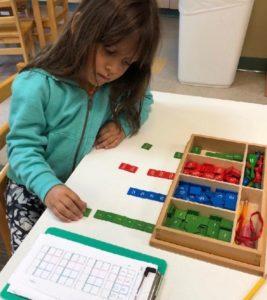 Gifted children, those who are ahead of their peers in one or more developmental areas, have specialized educational needs. While not the only schooling option, Montessori preschools are especially well-positioned to meet the unique needs of these children. Here are the various ways that the Montessori approach to teaching benefits gifted children.
Gifted children, those who are ahead of their peers in one or more developmental areas, have specialized educational needs. While not the only schooling option, Montessori preschools are especially well-positioned to meet the unique needs of these children. Here are the various ways that the Montessori approach to teaching benefits gifted children.
Activity Choices Let Children Pursue What They Enjoy
A fundamental principle of the Montessori approach is to let children choose the educational activities that they engage in. For some children preferred activities are artsy endeavors, while others tend more toward the math and science disciplines. Still other children might even like more physical types of learning, such as building or acting.
Whatever a gifted child enjoys doing, they’re free to pursue that particular discipline through one or more activities at a Montessori preschool. Compared to a more directed setting where kids must study what they’re told to, this choice-driven strategy itself has multiple advantages for kids who ahead in an area:
- Children grow in their area of giftedness, as they often choose to focus on that area because it comes relatively easily to them
- Children develop an internal drive to pursue their talents, as they can explore their abilities without outside pressure to focus on those abilities
- Children gain confidence, as they frequently progress at a pace that provides ample opportunities to see achievement
As a gifted child sees themselves grow in their area of interest, the drive and confidence they gain lay a solid foundation for a lifelong pursuit of learning and personal growth.
Exposure to Other Activities Fosters Curiosity
As important as opportunity to grow in a particular area of giftedness is, it’s also important that children aren’t pigeonholed into one area of interest. For instance, a child who likes music might also prove to be an adept mathematician, for there are multiple connections between math and music. To foster only music and not math for such a child would be a travesty.
Moreover, children have to eventually be competent in a wide array of disciplines to be successful in life. Even the most skilled specialist needs basic abilities in many areas that may not be related to their primary area of giftedness.
At a Montessori preschool, every child is exposed to many different disciplines.
First, simply having a choice of activities lets kids explore various areas of learning. Every day they come to preschool, and at several points during each day, kids are given a chance to learn about something else and in another way.
Second, children sometimes themselves decide to study disciplines they aren’t personally interested in or gifted if a peer is studying the discipline. The draw to do something that a friend’s engaged in is powerful, and that’s a good peer influence when the activity expands a child’s general understanding of the world and or themselves.
Freedom of Choice Teaches Social Skills
The natural flow of children from activity to activity that occurs in a Montessori preschool ultimately also affords many chances for kids to learn social skills. Children will inevitably be in situations where they must help each other, share an object, wait, play together, and even resolve conflicts. All of these situations help kids learn how to navigate relationships.
In some ways, the social skills that are learned at a Montessori preschool may even be more valuable for a gifted child than any growth in their preferred field of study. Kids who learn to be kind and generous experience more academic and career success than their less-kind peers. No matter how good a child is in any one area, there’s no substitute for treating others well.
To learn more about enrolling your child in a Montessori preschool, contact Miniapple International Montessori School.

